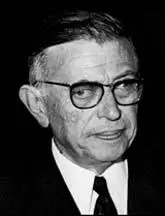Jean-Paul Sartre

Jean-Paul Sartre was born in Paris, France, on 21st June, 1905. After studying at the Sorbonne he taught philosophy at La Havre, Paris and Berlin. An existentialist, he published his autobiographical novel, Nausea in 1938.
On the outbreak of the Second World War Sartre joined the French Army and fought during the Western Offensive. Captured by the German Army in June 1940, he remained a prisoner of war until escaping in March 1941.
Sartre returned to Paris and returned to teaching and writing. This included two plays, The Flies and No Exit. He also joined the French Resistance and became co-editor with Albert Camus, of the clandestine newspaper, Combat.
After the war Sartre became a leading figure of the left-wing in France. In 1946 he founded with Simone de Beavoir, the advant-garde monthly Modern Times. He also published an explanation of his philosophy in his book Existentialism and Humanism (1948) and Being and Nothingness (1956). Other notable works include Crime Passionnel and the trilogy Paths of Freedom. His autobiography, Words, was published in 1964.
In the late 1960s Sartre became one of the leaders of the opposition to the United States policy in Vietnam. He also supported the student rebellions in 1968.
Jean-Paul Sartre died in Paris on 15th April, 1980.

